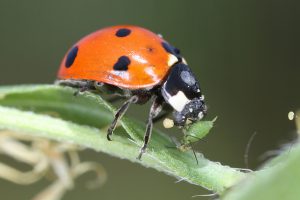Global warming may increase pests in conventional agricultural vs. organic systems
 Photo credit: John Flannery
Photo credit: John Flannery
A recent study published in the Journal Integrative and Comparative Biology has found that organic systems may be more resilient to pest pressure as global temperatures increase. In organic and conventional alfalfa fields researchers created enclosures and stocked each enclosure with pea aphids (an agricultural pest), ladybeetles (a beneficial pest predator), or both. They then manipulated the temperature to simulate a two-degree increase in half of the enclosures to understand how changes in temperature would affect the pests and predators in organic and conventional farming systems. Under normal conditions, the aphid populations were similar in organic and conventional systems. However, under warmer conditions, aphid abundance was higher in the conventional system compared to the organic systems. Furthermore, under warmer conditions, predator abundance declined in the conventional plots while predation was unchanged between normal and warm conditions in the organic plots. The authors conclusion: biological control may be more easily maintained in organic than in conventional systems as global temperature increases.


